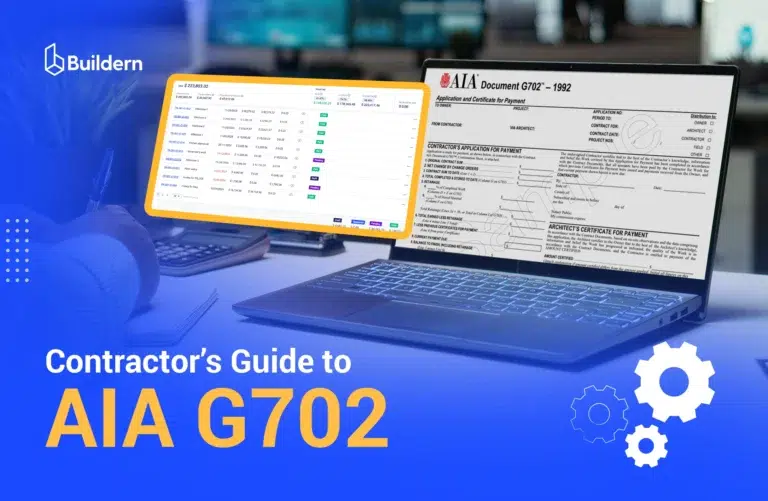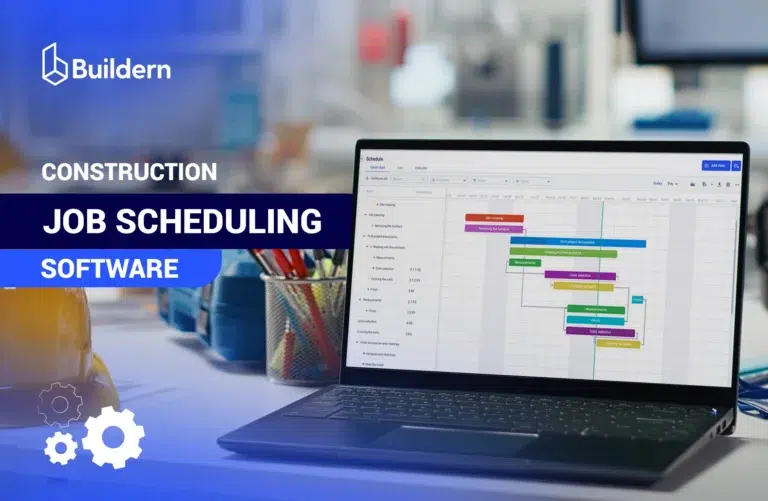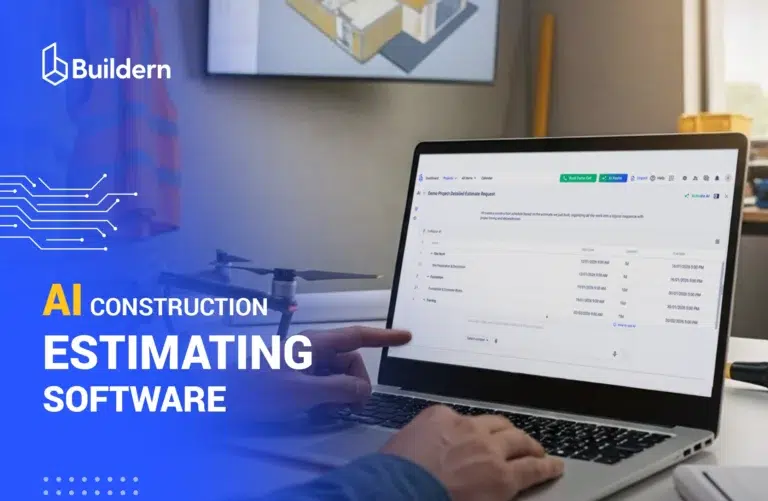Is It Better to Build or Buy a House? Pros, Cons, and Costs Explained
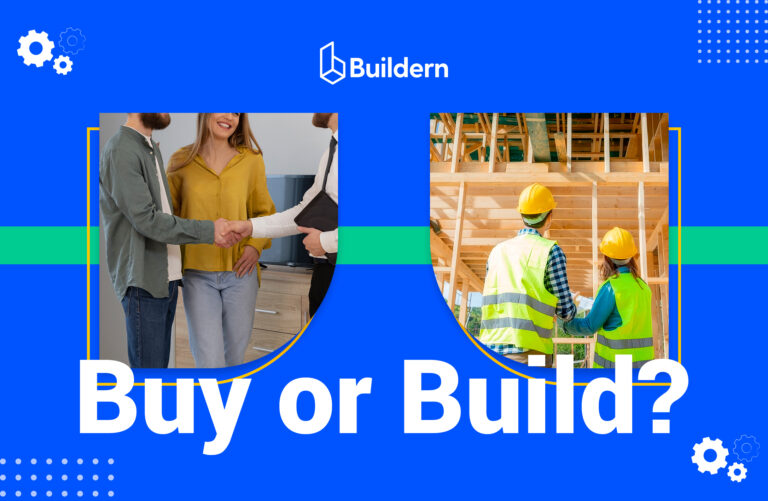
The dream of owning a house is universal, no matter where you live. However, it comes with one fundamental question: should you build from scratch or buy an existing one?
It’s a choice nearly every prospective homeowner faces at some point. For some, the answer is clear, as they say buying is simpler. They prefer to skip the estimates, roofing choices, contractor negotiations, and endless cost breakdowns, choosing a move-in-ready home or an apartment with fewer headaches.
Others see it differently. Building a house for them is to make a dream come true. Future homeowners want to ensure every corner, color, and feature reflects their taste.
In this blog, we’ll figure out the pros and cons of both options to help decide if it is better to build or buy a house.
Table of Contents
- A Long-Term Project or a Quick Move-In
- Key Factors to Consider
- Market Conditions for Building or Buying

A Long-Term Project or a Quick Move-In
Building and moving quickly or launching a long-term project has clear advantages and potential drawbacks. There is no clear recommendation on what to do. The right choice depends on lifestyle, personal priorities, and, most importantly, budget.
On one hand, building offers the excitement of creating a unique space, but it requires patience and project management skills. Buying, on the other hand, means moving in sooner, but there is a risk of having additional renovations. Let’s discuss the pros and cons of each decision.
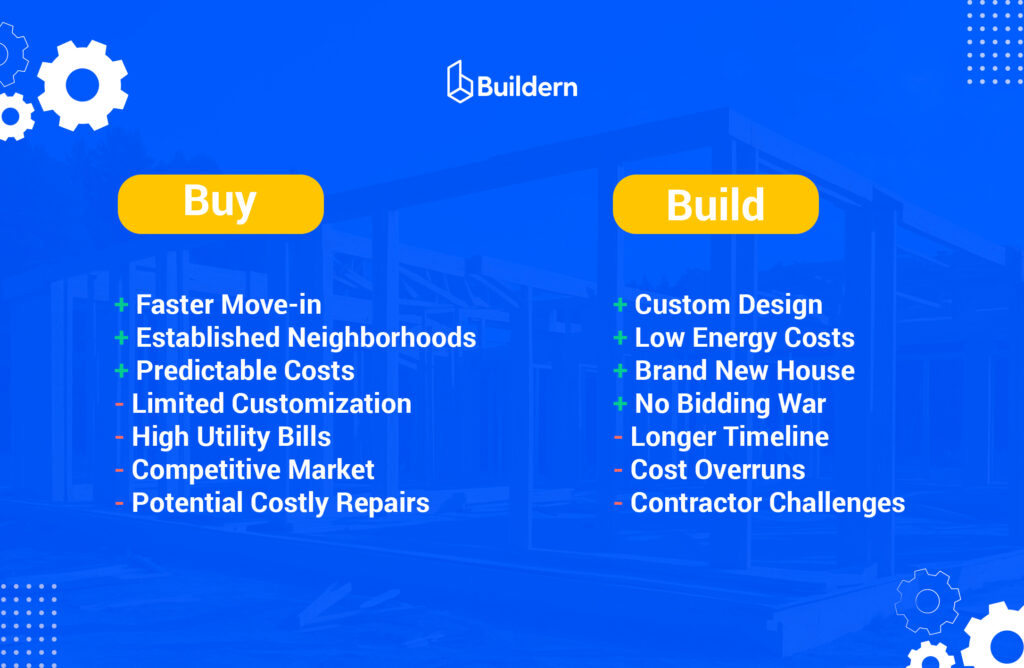
Pros of Buying a House
Moving in Faster: The biggest advantage of buying a house is the speed of moving in.
Unlike building, which can take months or even years, buying is a faster solution. It’s ideal for those who have urgent timelines or simply want less waiting and uncertainty. For example, closing a house deal takes, on average, around 44 days in the United States. However, a mortgage closing can take longer due to some unexpected issues.
Necessary Amenities: Buying in an established neighborhood often means you’re stepping into a ready-made environment. There are usually more old trees; no need for landscaping from scratch. When building, this can take decades to develop. Besides, water, sewer, and utility connections are already in place. It’s a move that skips the groundwork.
More Location Options: Buying often gives you access to neighborhoods where vacant lots are difficult to find. If you’re set on a specific school district, close to work, or within walking distance, purchasing a house is easier. In many established areas, finding land simply isn’t an option.
Renovating at Your Own Pace: There is no need to hurry with improvements. Projects like a kitchen renovation can be done gradually. The buyer can align each upgrade with budget and availability. The step-by-step approach is easier to manage than building upfront.
Cons of Buying a House
Limited or No Customization: It’s always difficult to buy a house of your dreams. There is something that may not match your wishlist. In many cases, the buyer chooses between location and features. For example, securing a prime district with a good school nearby, but settling for a home that needs renovation. There is often some level of compromise.
Higher Utility Bills: Existing homes may come with outdated windows and mechanical systems. The house may not comply with modern energy-efficiency standards. This means the homeowner gets higher monthly costs for heating, cooling, and water usage. Of course, upgrades can improve efficiency. However, this is an additional investment to consider when buying a house.
Competitive Market: Buying a house in the U.S. means being involved in stiff competition. Well-priced homes in good neighborhoods can attract multiple offers within days. Buyers may face bidding wars, and it’s necessary to make a decision quickly, which is quite stressful.
Potential for Costly Repairs: Buying does not mean you will not renovate. Homes can hide expensive problems as aging roofs, worn-out HVAC systems, and outdated plumbing. Sometimes it can be disclosed when you have already lived there for several months. These repairs can quickly add up, affecting the budget.

Pros of Building a House
Custom Design: Building from scratch involves getting every detail done to meet your preferences and needs. The homeowner controls all aspects, including the floor plan, roofing, and colors, and is free to make change orders. Besides, building means a new home reflects your lifestyle, and it’s rarely possible when buying an existing property.
Low Energy Costs: Homes built today are far more energy-efficient than those constructed 30 years ago. The homeowner can install energy-efficient windows, smart home systems, and solar panels. Everything is designed to reduce utility bills. When deciding whether to build or buy a house, these features can make a significant difference in long-term energy costs.
Brand New House: Even if the house is fully renovated, there may be some parts, like the pipes, that are old, which may cause problems in the future. Building is to bring everything new. It gives an experience of living in a brand new house.
Low Competition: This depends on the area, as there are highly competitive plots, but not as much as in the case of buying. You can choose your ideal location, including a remote area or a lot close to the city, without competing against multiple buyers.
Cons of Building a House
Longer Timeline: No one would argue that building a home takes significantly more time than buying. The construction process is unpredictable. Delays can arise from weather, permit approvals, or subcontractor availability. Even with careful planning, construction schedules often extend beyond initial plans.
Risk of Cost Overruns: Even with carefully created estimates and budgets, building a home can quickly become more expensive than expected. Change orders, fluctuating material prices, and many other factors affect the original budget.
More Decisions and Stress: Building is a long-term project that requires much effort. It’s like having an additional job. There are numerous layouts, materials, and fixtures. The details need to be approved fast, as they may affect another phase of the construction project. In the case of buying a home, most decisions are already made.
General Contractor Challenges: Finding a reliable general contractor who executes the project exactly as planned can be difficult. Communication may be a problem, as explaining your vision and tracking progress is not always that easy. A solution here is when contractors use construction project management tools with built-in messaging and other features. This makes coordination easier, helping you monitor work, approve changes, and keep the project on schedule.
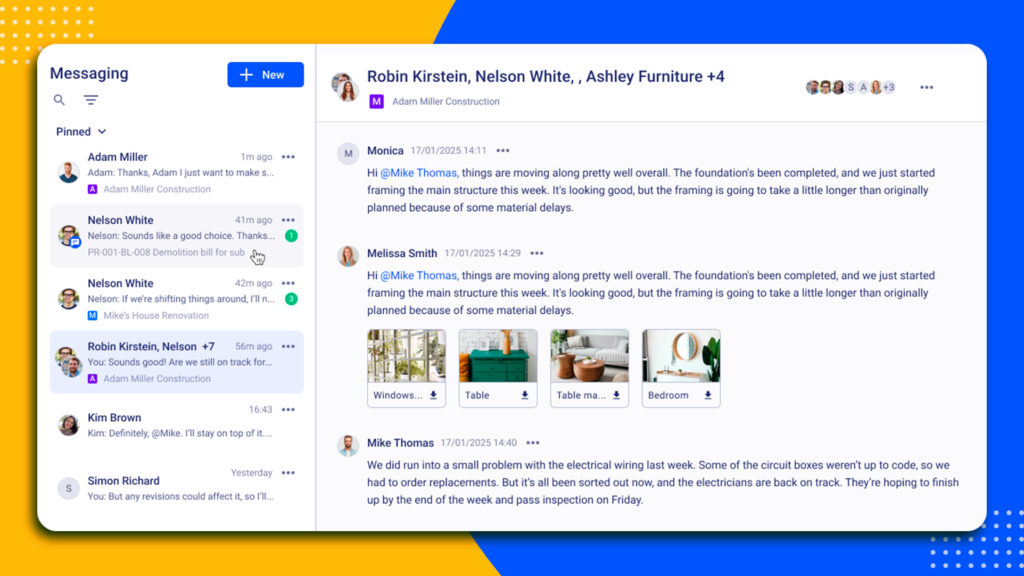
Key Factors to Consider
Before deciding if it’s better to build or buy a house, it’s essential to assess several key aspects that will have the biggest impact on your decision.
Budget
Financial aspects should be your starting point. Building a home is impossible without a larger upfront investment. There are also extra costs for upgrades. Buying may be more budget-friendly initially, but could bring repair and renovation expenses later.
Time
Construction project planning may take months, depending on design, permits, and construction speed. In addition to other conditions, finding a reliable contractor may take time. So, if you decide to move, for example, by summer, there is no guarantee you will. In the case of buying, this can be much faster.
Long-Term Investment Goals
A house is one of the major investments a person makes in their life. A well-built, energy-efficient home can hold strong value over decades. However, a property in a prime location often appreciates faster.
If you’re building, consider how the area may grow, the quality of local infrastructure, and potential resale demand. When buying, evaluate the home’s renovation potential.
Market Conditions for Building or Buying
Weighing a number of factors will help you make the right decision. However, the state of the market at the moment you make the decision is very important. Market conditions such as high competition, rapidly rising prices, or favorable mortgage rates may impact the decision. Let’s consider building or buying in the US and Australia.
Is Building a Home Cheaper Than Buying in the U.S.?
As of July 2025, the median single-family home price in the United States stands at $465,890.
Mortgage rates remain elevated at 6.7%, though slightly lower than last year’s average.
Besides, only about 29% of homes sold in July went for more than the asking price. This shows that bidding wars are becoming less common, which is good for buyers.
Of course, prices still depend heavily on where you’re looking. California, Hawaii, Massachusetts, Washington, and Colorado are among the most expensive states to buy a home.
One also has to take into account the land prices before thinking about building a new home. The average cost per acre in the U.S. is $19,121.
Meanwhile, the median construction cost of a single-family home was around $428,215 in 2024, according to the survey by the National Association of Home Builders.
Building vs. Buying in Australia
Buying a home has become very expensive. According to the Australian Bureau of Statistics, in March 2025, the average house price surpassed AUD 1 million ($652,000). Prices vary widely by state, with Western Australia, South Australia, and Queensland being among the most expensive markets.
As for building a new home, bad news for those willing to build in Australia is that the prices for land have been growing fast. In 2024, the average price for a residential lot reached AUD 351,044 ($228,000).
Building a new home in Australia has become significantly more expensive in recent years. Average construction costs have surged by about AUD 100,000 over the past four years.
Of course, this depends on a state as the prices, for example, in New South Wales and Victoria are much higher than in Western Australia.
How Long Does it Take to Build a House vs Buy One?
Buying a house is significantly faster than building one. Of course, much depends on the country. For example, in the United States, closing a deal typically takes around 44 days. Meanwhile, building a house from scratch is a long process wherever you live. Even with careful planning, construction schedules frequently extend beyond initial estimates. So, buying is a clear winner for speed.
Is Building Worth It?
If a complete customization is your top priority and you have patience for a long-term project, building is your best choice. The main advantage is that you exactly get what you want: from floor plans to finishes. Building makes sense when you have a clear vision and are not afraid of certain budget overruns that often happen during the construction process.
What Hidden Costs to Expect When Building a House?
Expect several cost overruns beyond your initial budget when building. This depends on many factors. First, change orders during construction can quickly add thousands, especially when the homeowner modifies plans mid-project. Fluctuating material prices can increase costs unexpectedly. Weather delays and subcontractor availability also extend timelines, increasing financing costs.

